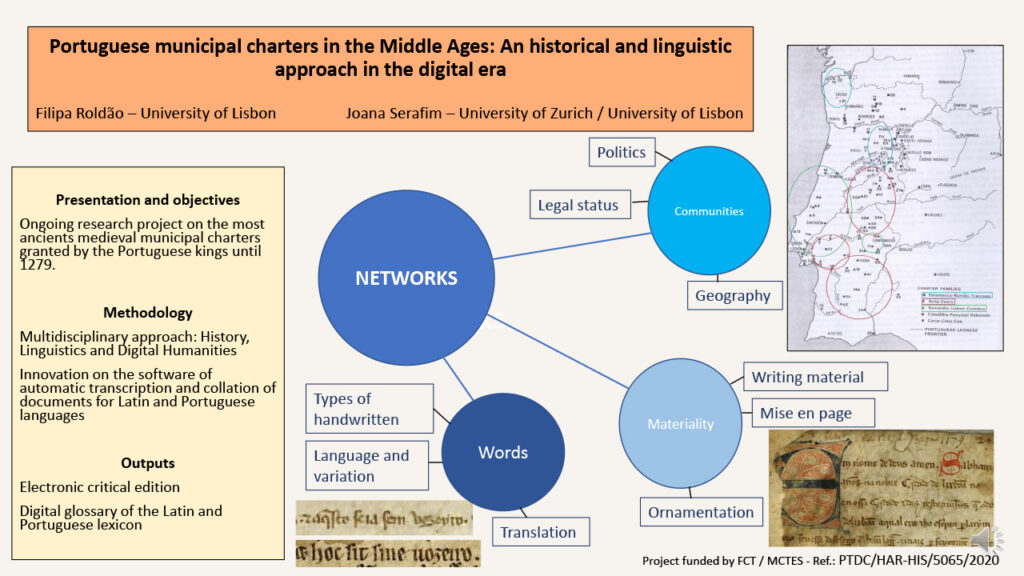Filipa Roldão and Joana Serafim
Time and Place: Thursday, 01.07., 16:00–17:00, Room 4
Session: Poster Session – Networks and Medieval Texts
Keywords: Manuscripts tradition; Municipal charters; Royal power; Middle Ages; Portuguese cities
This poster intends to present the main guidelines of an ongoing research project on the oldest medieval municipal charters granted by the Portuguese kings until 1279 as well as their copies and vernacular versions produced until the end of the 15th century. These charters – Forais – were the written formalization of a set of norms of relationship between the inhabitants of a community and between them and the king – especially in the areas of the exercise of powers, justice, taxation, and economic activities. The charters of some cities have become models for other urban communities that have adopted their normative provisions, resulting in families or networks of charters that, in some cases, went beyond the borders of the kingdom. Until now, the relationship that each charter establishes with the others and on its own in these networks has only been studied from the point of view of normative provisions, leaving aside an interdisciplinary approach to these medieval textual networks (Mattoso, Reis). In this project, we intend to implement a multidisciplinary approach, in which History, Diplomatics, Palaeography, Philology, Linguistics and Digital Humanities converged in the study of the manuscript tradition of these documents, sharing methodologies, analytical tools and interpretative frameworks (Roldão e Serafim). The instrumental objective of this project is to constitute an electronic critical edition of this corpus of Forais granted to the communities by the first Portuguese monarchs and also to draw up a glossary of the Latin and Portuguese lexicon in digital format. The use of Digital Humanities will be one of the most important methodological dimensions of this project: we will promote the semi-automatisation of the processes of transcription and collation of documents, based on the use of software already tested in the study and critical edition platforms of texts of our international partners. All results will be available in the virtual world in open access. When one studies the historicity of these texts and establishes their manuscript tradition it becomes possible to reflect on the circumstances and logics of transmission between urban communities, as well as within the royal chancellery itself in the construction of these charters. This approach seeks to shed some light on a specific case of a network – the textual network – understood both as evidence of the past and as an operative concept for historical and linguistic analysis in the 21st century.
Mattoso, José. 1995. Identificação de um país: ensaio sobre as origens de Portugal (1096-1325) – Oposição (Vol. 1, 5ª ed.). Lisboa: Editorial Estampa.
Reis, António Matos. 2002. Origens dos Municípios Portugueses (2ª ed). Lisboa: Livros Horizonte.
Roldão, Filipa e Joana Serafim. “Os mais antigos forais régios portugueses: uma proposta de estudo e de edição.” Medievalismo. Revista de la Sociedad Española de Estudios Medievales 31 (2021) (forthcoming).
